Candy Cane inspired soap bars couldn’t be more fitting as a homemade Christmas gift. If you’ve never made your own soap bars from scratch (with lye), please stop right here. Please read my beginner soap bar recipe first, or enrol in my soap-making course. That way, you will know all the safety precautions to take; and you’ll also benefit from the step-by-step visuals. This recipe is for intermediate soap-makers, so it assumes a bit of knowledge. If you’re an inexperienced soaper, but you really want candy cane soap, then rather buy melt-and-pour soap and follow my recipe from step 8 onwards.
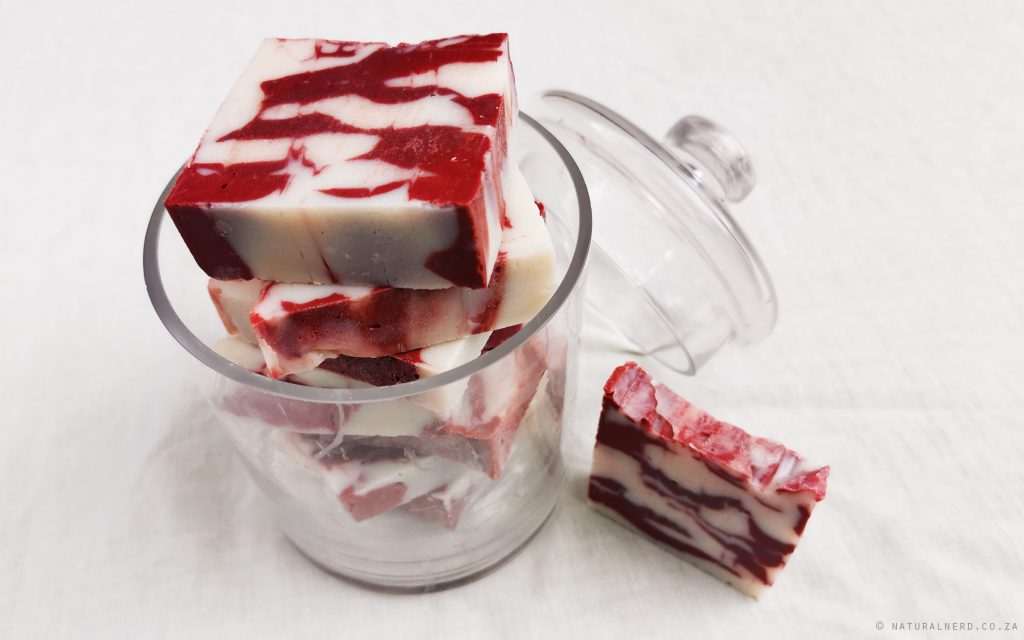
Candy Cane Soap Bar
Ingredients
For the Soap:
- 374g Distilled Water (at room temperature)
- 154g Caustic Soda
- 600g Coconut Oil
- 400g Sunflower Oil
- 5ml Peppermint essential oil
For the Colour:
- 1 teaspoon Zinc Oxide powder (for the white)
- 1 teaspoon Red Iron Oxide powder (for the red)
- 2 Tablespoons Sunflower Oil to dissolve oxide powders.
Equipment & Tools:
- A kitchen scale
- Safety gloves and goggles
- A heat-proof glass bowl for the water (minimum capacity: 500ml). Check that the bowl is microwave and dishwasher safe.
- Glass or ceramic bowl for the caustic soda (min. capacity: 250ml)
- Large stainless steel pot for the soap mixture (min. capacity: 2 litres)
- 2x containers to divide the soap mixture into its two separate colours (min. capacity: 750ml)
- 2x small containers to dissolve oxide powders with oil – tot glasses work well (min. capacity: 25ml).
- Immersion blender, or electric two-prong whisk
- Stainless steel spoon
- Non-serrated chopping knife to cut soap
- Soap moulds for 1.5 litres of soap (ice-cream/ margarine containers work really well too)
- White vinegar for cleaning any spills
- A cloth soaked in white vinegar for cleaning
Instructions
- Makes about 1.5 litres of soap, which works out to approximately fifteen 100g bars.
- Measure out the quantities exactly with a scale: This recipe is like chemistry. Unfortunately, there’s no compromise and you have to use a scale, and follow all instructions to a tee.
- Prepare your colours: Mix 1 teaspoon of zinc oxide with 1 tablespoon of a lightweight liquid oil, like sunflower oil, and set aside. Mix 1 teaspoon of red iron oxide with 1 tablespoon of sunflower oil and set aside.
- Make the lye solution: Slowly add the caustic soda to water in a glass mixing bowl (NOT the other way around). Do this step outdoors. Do not inhale any of the fumes from the reaction. Do not touch the solution. The solution will be murky and it will become hot, this is normal. Make sure that all the caustic soda crystals are dissolved by stirring very slowly with a stainless steel spoon. Be very careful when carrying this HOT bowl back indoors.
- Start heating the oils: Heat the coconut and sunflower oil in a genuine stainless steel pot. Do not let it get to boiling point, this is way too hot. If the oil is too hot, your soap will flop and turn into a volcano. If you have a thermometer, the ideal temperature for the oil is 50°C.
- Combine lye with the oil: First switch the stove off. Once both the oil and lye solution are roughly the same temperature (approximately 50°C), add the lye mixture to the oil. Again, please make sure that the stove is turned off at this point.
- Blend until you reach a very thin trace: Once the lye and oils are combined, start blending with an electric mixer or immersion blender. Immersion stick blenders achieve trace quicker (+/- 5 minutes) than two-prong mixers (+/- 10 minutes). Stop blending as soon as you see the first signs of trace, don’t continue blending until the mixture gets to a thick trace. If you see traces of droplets on the surface, stop! You need a thin trace in order to have the time to play around with colour and patterns.
- Add fragrance oil: Gently stir in 5ml of peppermint essential oil, or mint fragrance oil.
- Divide soap mixture into two seperate containers: Pour half the mixture into one container, and the other half into another container.
- Add colour: In the first container, stir in the zinc oxide mixture. In the second container, stir in the red iron oxide mixture. Your soap mixture will just keep getting thicker with time, so you need to work quite quickly before the soap becomes too solid to work with.
- Layer the soap into your mould: Layer the soap by pouring a bit of the white soap mixture into your mould, and then a bit of the red soap mixture, then more of the white soap mixture. Repeat until your mould is full. You can pour thin, neat layers; or blobs and globs (like me).
- Insulate your mould overnight: Cover the top with plastic or cardboard, then wrap your mould in towels or blankets for insulation and store on a level surface overnight.
- Cut soap into bars after 24-48 hours: After 24 hours your soap will have the texture of cheddar cheese, which makes it easy to cut. If you wait longer than 48 hours, it may be difficult to cut your soap, and it may crumble. Cut your soap with a non-serrated knife.
- Let your soap cure: Place your bars in a well-ventilated area, away from direct sunlight and allow them to cure for a minimum of 1 week until it is safe to use, and between 4 – 6 weeks for best results. Remember to turn them occasionally, so that each side gets exposure to the air.
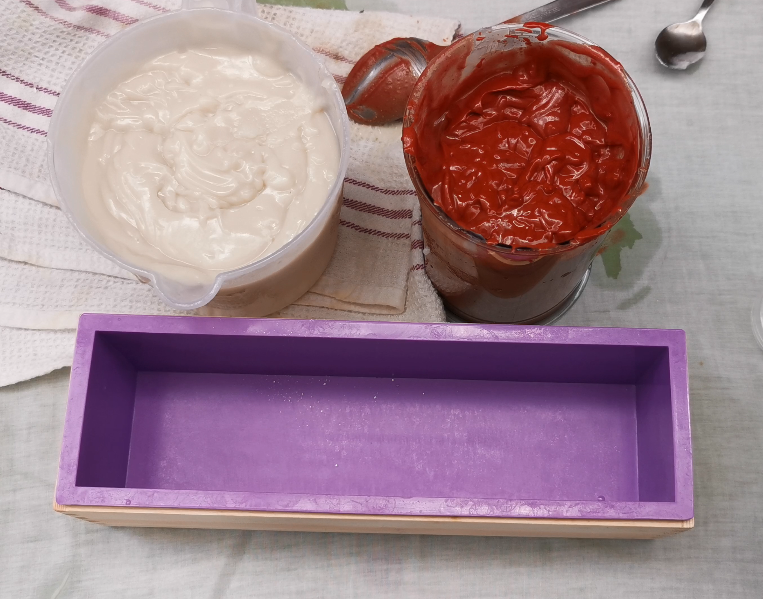
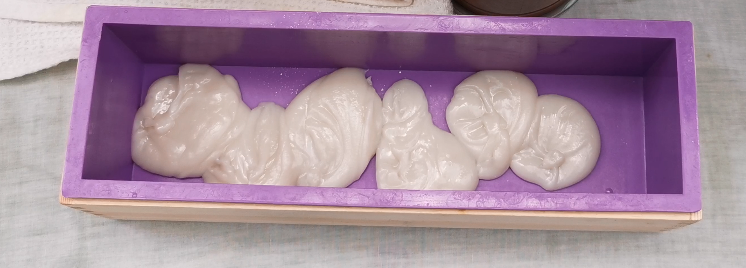
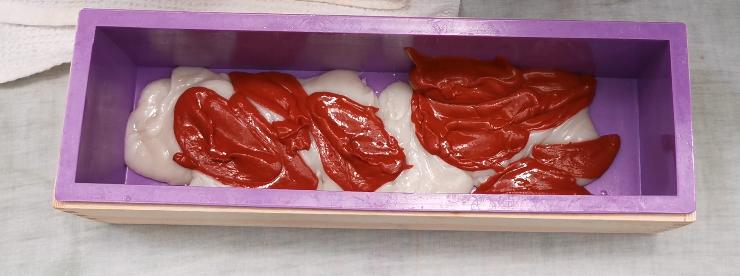
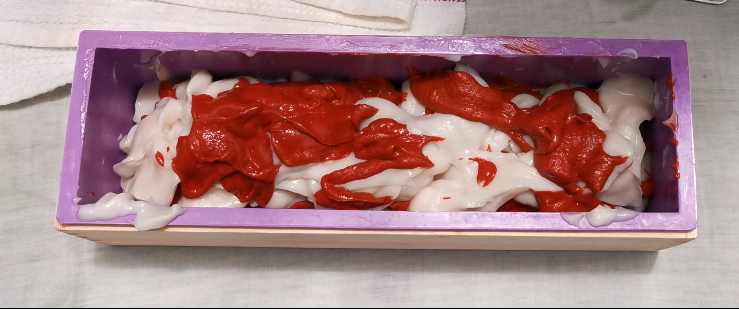
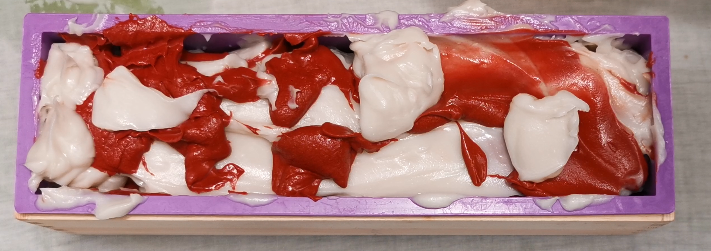
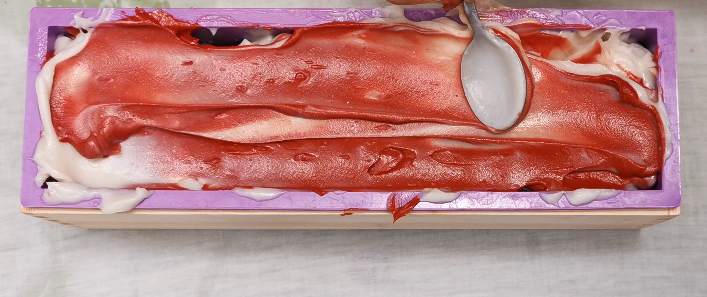
Notes
1. If you are not ready to work with lye and make your own soap from scratch yet, then buy melt-and-pour soap and follow from step 8 – 12.
2. You cannot substitute the oils in this recipe. If you do, you’ll have to run it through a lye calculator again to make sure you have enough caustic soda for the oils you want to use.
3. You may multiply the quantities in this recipe to make a larger batch.
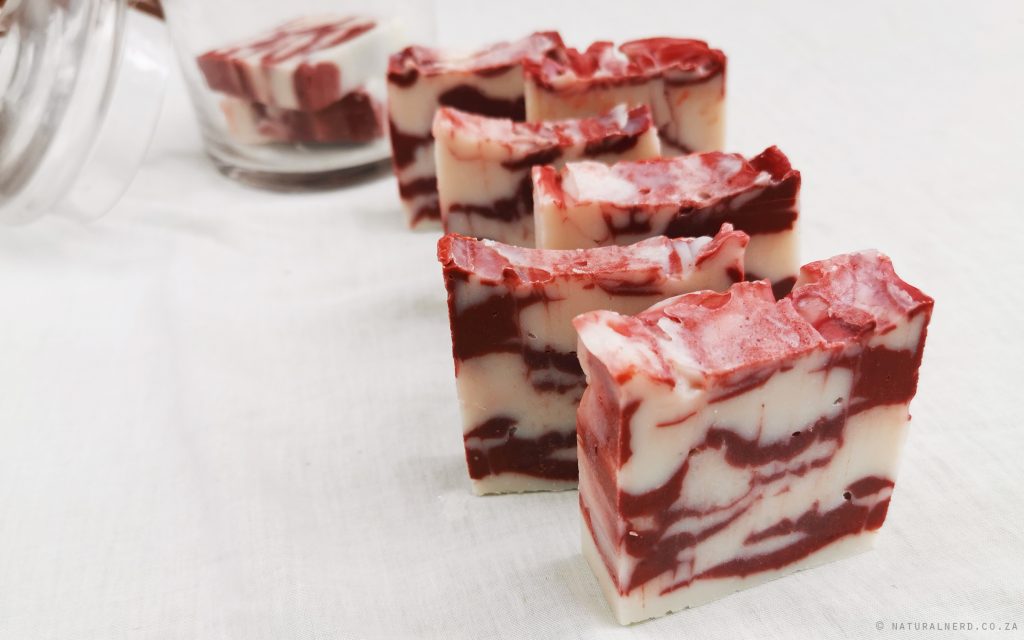
Cost & Shelf Life
Cost price: R4.77 per 100g soap bar, or R71.50 for the entire 1.5kg batch (in 2019, based on best retail prices I’ve found.).
Lasted me about: 2 weeks using every day (one bar).
Shelf life: 2 years if stored away from direct sunlight.
Challenge
If you’ve left Christmas gifts to the last minute, then the curing time may be a bit of a bump. Try to make this at least one week before it’s gift-giving time.
Cherry on Top
It’s not just homemade soap, it has that creatively clever twist for a Christmas gift.
Ingredient Information
- Red iron oxide: is a naturally occurring chemical compound composed of iron and oxygen. It is a natural pigment which is used as a colouring agent. For example, rust is iron oxide. Iron oxides are gentle and non-toxic, and not usually irritating to the skin. Iron oxides are oil-soluble. (buy here)
- Zinc oxide: occurs naturally as the rare mineral zincite, but most zinc oxide is produced synthetically. It is widely used and considered safe in natural and organic cosmetics. It is a white, oil-soluble powder, which is often used to whiten cosmetic products. It is also used to treat a variety of skin conditions such as nappy rash and eczema, and is used in calamine lotion. (buy here)
- Caustic soda: is also known as sodium hydroxide (NaOH), which most people know as drain cleaner. It is a highly alkaline substance (pH 14) used to dissolve fats in drains, and saponify oils into soap. Although it is a hazardous chemical, in the soap-making process it is necessary to convert all oil into soap. When measured accurately, there will be zero caustic soda in your final soap bar. The final products of the chemical reaction are sodium salt, glycerine and soap. This is why it is safe in natural soap, but it should be used with caution. i.e. Water + Caustic Soda + Oil —> Salt + Soap + Glycerine. (buy here)
- Coconut oil: is used to create a hard, cleansing bar of soap with good lather. Since all the oil turns to soap in the chemical reaction, I recommend using the cheapest and most refined coconut oil. Remember, it also washes down the drain anyway. (buy here)
- Sunflower oil: is used to create a moisturising and gentle bar of soap.
Let me know how your candy cane soap turns out in the comments below. Photos are welcome too 🙂


What a pleasure to find a fellow South African with such useful recipes to make soap by using affordable products. I am fairly new to this and have probably watched more soap tuts than most people. My home is currently full of various stages of curing soap (some flops too). Would you mind me asking you if you can advise on bulk essential oil products in RSA?
Thank you for you for your most inspiring input .
Thank you for encouraging comment Lola. It always makes my day when I hear positive feedback – that is what keeps this blog going. I’m happy to hear that you are a fellow soap enthusiast. If you’re interested in learning more about soap-making, you should check-out my online course. Here’s the link: https://naturalnerd.thinkific.com/ . Regarding buying essential oils in bulk – Yes, there is a wholesale supplier called Nautica Organics (just Google them). They sell essential oils and fragrance oils in bulk – the smallest size available is 100ml. After you’ve registered with them, you can make your orders via email. I hope that helps. Thank you again for sharing your lovely comment 🙂
LOVE this recipe. Would recommend it to anyone who enjoys soap making and likes to play around with fragrances and patterns.
I’ve never had a flop with this recipe 🙂
Thank you for your feedback Naomi. No flops! That’s wonderful to hear 🙂